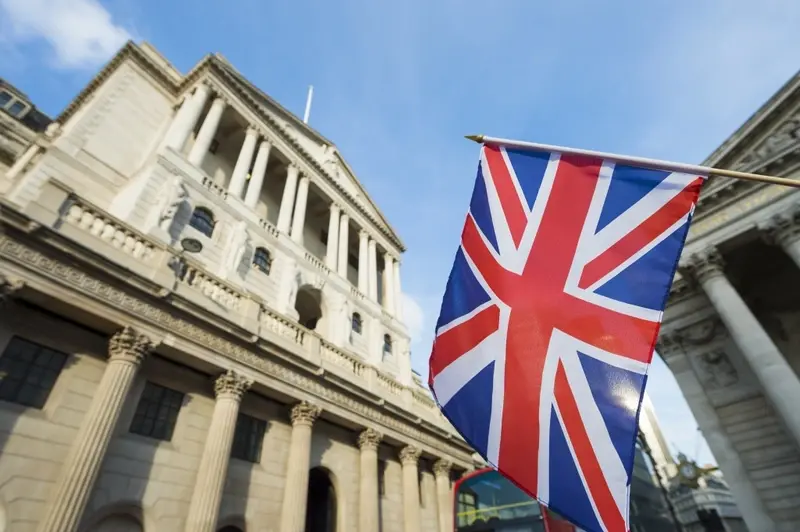
Stock prices in London reversed morning losses and rose slightly after the Bank of England on Thursday followed through with its third consecutive interest rate hike in a bid to tame rampant inflation.
The Monetary Policy Committee voted by a majority of 8-1 to increase Bank Rate by 0.25 percentage point, to 0.75% from 0.50%.
The central bank's deputy governor, Jon Cunliffe, was the sole policymaker to have voted against the proposition, preferring to keep UK rates unchanged.
The BoE warned Russia's invasion of Ukraine is likely to intensify inflationary pressures, exacerbate global supply chain disruptions and increase uncertainty over the economic outlook.
‘Inflation is expected to increase further in coming months, to around 8% in 2022 Q2, and perhaps even higher later this year,’ the central bank said.
The BoE said some further modest tightening may be appropriate in coming months, but acknowledged there were ‘risks on both sides of that judgement’ depending on how medium-term prospects for inflation evolve.
The FTSE 100 index was up 35.13 points, or 0.5%, at 7,326.81 midday Thursday. The mid-cap FTSE 250 index was marginally higher, up 0.46 point at 20,906.00. The AIM All-Share index was up 5.31 points, or 0.5%, at 1,020.62.
The CBOE 100 index was up 0.2% at 727.36. The CBOE 250 was down 0.3% at 18,409.33. Cboe Small Companies was up 0.3% at 14,455.95
In mainland Europe, the CAC 40 stock index in Paris was up 0.2%, but the DAX 40 in Frankfurt was down 0.4%.
The pound was quoted at $1.3112, down from $1.3207 prior to the Bank of England decision but still up from $1.3098 at the London equities close Wednesday.
‘The Bank of England has found itself caught between a rock and a hard place,’ commented Giles Coghlan, chief analyst at HYCM. ‘The markets had largely priced in today's dovish interest rate hike.’
He added: ‘While the prospect of stagflation is more likely, the central bank now recognises that modest tightening may still be set to come in further months, albeit with the risk of slowing growth by hiking too quickly.’
The fallout from the war in Ukraine could reduce global economic growth by ‘over one percentage point’ in the first year after the invasion, the OECD warned in a report on Thursday.
The impact ‘if sustained’ would produce ‘a deep recession in Russia, and push up global consumer price inflation by approximately 2.5 percentage points’, the group of developed economies said in its report.
In Ukraine, authorities in the besieged port city of Mariupol said Russian forces bombed a theatre where ‘hundreds’ of civilians were taking shelter and share a photo showing the middle part of the building completely destroyed.
The office of Ukrainian President Volodymyr Zelensky on Wednesday rubbished the Kremlin's proposal for its neighbour to become a neutral country like Sweden or Austria, saying Kiev would need ironclad guarantees of its security.
US President Joe Biden branded Russian President Vladimir Putin a ‘war criminal’ for the first time on Wednesday. The Kremlin quickly hit back, calling the comment ‘unacceptable and unforgivable’.
In the FTSE 100, Diageo was up 2.5% after JPMorgan raised the distiller to 'overweight' from 'neutral'.
At the other end of the large-caps, Ocado was the worst performer, down 8.5%. Ocado Retail, the online grocery joint venture between Ocado Group and Marks & Spencer, warned of slowing revenue growth and rising inflation.
M&S shares were off 4.4%.
Ocado Retail said revenue declined by 5.7% in the 13 weeks that ended February 27 from a year before but was up 32% from 2020.
Retail revenue fell to £564.7 million from £599.1 million a year before. Average orders per week rose by 12% to 367,500 from 329,500, but average basket size shrank by 15% to £124, ‘as customer behaviours return towards pre-Covid levels’.
Looking ahead, Ocado Retail expects revenue growth of 10% for the full-year, though this should in the high-teens toward the end of the year, it said. Meanwhile, profit margins will be hurt by food and energy price inflation.
‘While this venture has been a success for both parties, the pressure on margins from rising inflation looks to be a growing issue and will not help Ocado at group level given the solutions business remains heavily loss-making,’ said AJ Bell's Russ Mould.
M&G was down 4.8% and NatWest was down 3.5% after the stocks went ex-dividend meaning new buyers no longer qualify for the latest payout.
In the FTSE 250, OSB Group was the top gainer, up 14%, after the specialist lender reported robust annual results and launched a share buyback programme.
Net interest income for 2021 grew 24% to £587.6 million from £472.2 million in 2020, with total income rising 24% to £629.0 million from £508.6 million. Pretax profit surged 78% to £464.6 million from £260.4 million.
OSB declared a total dividend of 26.0 pence per share, up from 14.5p paid out in 2020.
In addition, OSB said it intends to commence a share repurchase programme to return up to £100 million to shareholders, starting on Friday.
Trainline was up 5.0% after the coach and rail ticketing platform said ticket sales in financial 2022 were well on their way to recovery from the blow dealt by the pandemic.
The London-based firm said net ticket sales had recovered to 68% of pre-Covid levels, with £2.52 billion sold in the financial year that ended February 28. This was over triple the £783 million sold in financial 2021.
At the other end of London mid-caps, Helios Towers was the biggest faller, down 7.0%, after the Africa-focused mobile phone tower developer posted a widened loss for 2021.
Helios reported a pretax loss of $119.4 million, widened from $20.9 million in 2020. This was due to an increase in finance costs from capital raises to support acquisitions during the year, plus a higher interest cost on $250 million in bonds issued in March 2021, which are due 2027.
Looking ahead, Helios Towers said it expects to continue reporting losses in the near term, as it integrates the assets it bought.
Elsewhere, Deliveroo was up 9.5% after the food delivery firm said that 2021 was a year of strong growth that it is on a ‘path to profitability’.
For 2021, revenue was £1.82 billion, up 57% from £1.16 billion in 2020, but Deliveroo's pretax loss widened to £298.2 million from £212.6 million. Deliveroo said delivery orders totalled 300.6 million last year, up 73% from 173.7 million orders in 2020, and gross transaction value was £6.63 billion, up 67% from £3.98 billion in 2020.
Looking ahead, Deliveroo guided for 15% to 25% growth in GTV at constant currency in 2022, with a higher growth rate in the second half than in first half, due to a stronger comparative for the first half.
Deliveroo expects to reach adjusted Ebitda breakeven at some point in the second half of 2023 or first half of 2024.
The euro was priced at $1.1055, higher against $1.1005 late Wednesday.
The eurozone's annual inflation rate jumped to a fresh high in February, figures from Eurostat showed.
On an annual basis, the consumer price index rose 5.9% in February, accelerating from a 5.1% rise in January. The latest reading just beat the market forecast, cited by FXStreet, of 5.8% and remains well above the European Central Bank's 2.0% inflation target.
Against the Japanese yen, the dollar was trading at JP¥118.60, up from JP¥118.50 late Wednesday.
Brent oil was quoted at $102.60 a barrel Thursday at midday, up sharply from $99.33 late Wednesday. Gold stood at $1,944.75 an ounce, higher against $1,908.85.
New York was pointed to a lower open following a strong close on Wednesday, after the US Federal Reserve hiked interest rates for the first time since 2018.
The Dow Jones Industrial Average was called down 0.2%, the S&P 500 down 0.2% and the Nasdaq Composite down 0.3%, based on futures trading. The indices closed up 1.6%, 2.2% and 3.8% respectively on Wednesday.
The US central bank raised the federal funds rate range to 0.25% to 0.50% on Wednesday, as widely forecast by the market. The dot-plot was in focus. The chart indicated a median expectation of a 1.9% funds rate at the end of 2022. The median view for the funds rate at the end of 2022 was 0.9% back in December. For 2023, the median forecast rose to 2.8% from 1.6% back in December.
Copyright 2022 Alliance News Limited. All Rights Reserved.




